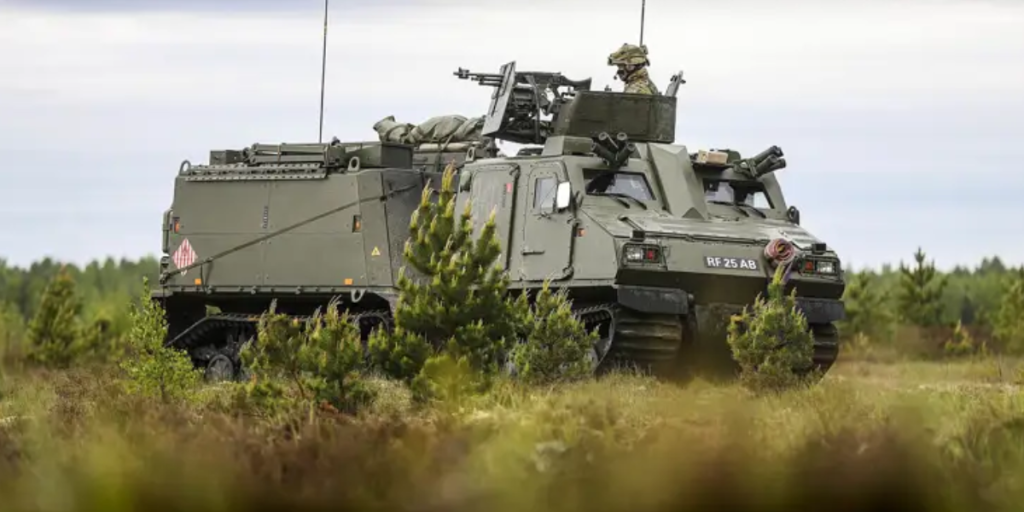There are moments in history when the fog lifts and the stakes become unmistakably clear. The 2025 Strategic Defence Review is such a moment. A document rooted in sobering realism and strategic urgency, it affirms what many of us have long argued: Britain must re-arm – not gradually, not symbolically, but decisively and at pace.
This isn’t rhetoric. It’s not sabre-rattling. It’s the measured conclusion of a review that pulls no punches: Britain is entering a new era of threat, with a hollowed-out military, outdated procurement practices, and adversaries – chiefly Russia and China – actively modernising, coordinating, and probing the seams of our resilience.
The authors of the Review, including former NATO Secretary-General Lord Robertson, General Sir Richard Barrons and Dr Fiona Hill, paint a picture of a transformed global security environment. Great power competition has returned. Strategic stability is crumbling. And, most pressingly, the technological character of war is evolving faster than Britain’s defence apparatus has adapted. If we continue to drift, we will be caught flat-footed in the next major conflict.
Rearmament is not optional
This Review underscores that simply increasing defence spending is necessary but insufficient. Yes, it is welcome that the government has committed to raising spending to 2.5% of GDP by 2027, and possibly to 3% in the next Parliament. These are overdue steps to reverse decades of defence cuts, including the near-halving of British Regular forces since the end of the Cold War.
But money alone won’t fix a broken system. What’s required is nothing short of cultural and structural transformation. The Review acknowledges this and outlines a compelling agenda: create an “Integrated Force” that is digitally enabled, driven by constant innovation, and capable of operating in multiple domains – from undersea to cyberspace. Replace glacial procurement cycles with a segmented approach that allows for rapid adoption of technology. Break down internal siloes within the services and unite around a “NATO First” doctrine.

Industry must be a partner, not a passenger
Crucially, the Review recognises that a modern warfighting force is only as strong as the industrial base that supports it. The Defence Innovation initiative and new National Armaments Director are steps in the right direction. If Britain is to maintain readiness and strategic depth, it must be able to surge munitions production, support AI integration and build submarines or drones at scale and speed.
The plan to establish a £1.5 billion “always-on” munitions pipeline and build six new factories is not just a defence imperative – it’s an economic one. Defence, the Review makes clear, must become an engine of national growth. Jobs, innovation, export capacity – these are the dividends of rearmament if we get it right.
The threat is now
Some will ask: why now? The answer is stark. Russia’s war in Ukraine is not an isolated regional conflict. It is a demonstration of intent. Moscow is already rebuilding its forces. China is aggressively modernising its military and aligning more openly with rogue states like Iran and North Korea. NATO is the cornerstone of our defence, but it is also strained – and in a second Trump presidency, may become less reliable. Britain cannot afford to outsource its security.
Indeed, the Review’s most chilling conclusion is that we must now be ready not just to deter but to fight a “peer” adversary. The world of counterinsurgency and limited interventions is giving way to the spectre of full-spectrum war, including cyber, space, and nuclear escalation. And, as the Review warns, if war comes, it will reach the British homeland – via sabotage, cyberattacks, and economic disruption.
A national effort, not a military one
This is why the Review rightly calls for a whole-of-society approach. National resilience, critical infrastructure protection, a 30% increase in cadet forces, and a new “digital warfighter” corps are not optional extras. They are part of a necessary mindset shift: that defence is not a siloed function, but a national responsibility.
Some might scoff at such language. But the alternative is a sleepwalk into vulnerability. The public knows this – Citizens’ Panel members quoted in the Review repeatedly say what politicians often won’t: “We need to have everything in place in case something happens… we need that insurance policy.”

Time for boldness
This is not a call for militarism. It is a call for strategic sobriety. For decades, we harvested the so-called “peace dividend,” hollowed out our forces, and hoped threats would recede. They haven’t. Now, as the Review makes clear, the bill has arrived.
Britain must re-arm – not to seek war, but to prevent it. Not to flex, but to be ready. Defence cannot be an afterthought. It must be the organising principle of government.
The Strategic Defence Review gives us the blueprint. We must now have the will to follow through.



